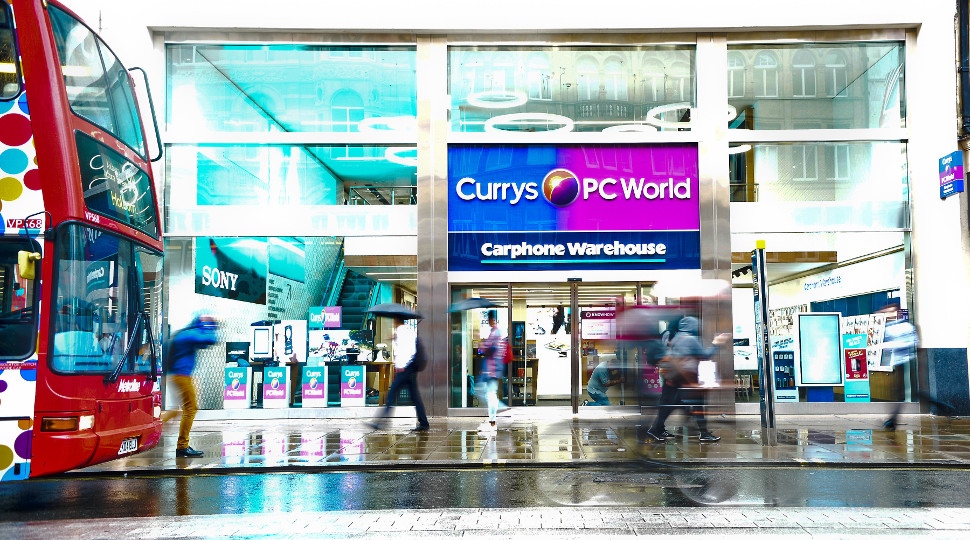Online helps Dixons Carphone recover two thirds of sales during lockdown
Online demand rose by 166 per cent over the past five weeks

Sign up for breaking news, reviews, opinion, top tech deals, and more.
You are now subscribed
Your newsletter sign-up was successful
Dixons Carphone says the enforced closure of its UK stores has cost the company £400 million, but strong online demand has recovered two thirds of sales.
The electrical giant shut its doors on March 28 in line with the government’s social distancing guidelines. However online channels have remained open for business, with sales of home office equipment, domestic appliances, fitness trackers and personal care products helping to make up the shortfall.
In the five weeks leading up to April 25, online sales grew by 166 per cent, although total electrical sales fell by 3 per cent during the same period.
- Dixons Carphone posts £440m loss
- Carphone Warehouse pulls Huawei 5G handsets
- Discover all of today's best mobile phone deals
Dixons Carphone online
CEO Alex Baldock said the priority has been to keep customers and staff safe during the crisis. The firm has adopted zero contact deliveries, provided staff with safety equipment and made changes to shifts in order to minimise risk.
“We’re setting new social distancing and hygiene standards that allow us to provide vital help to customers through the lockdown,” he said.
Steps have also been taken to ensure the long-term viability of the business. As many as 16,500 staff have been furloughed on full pay – 80 per cent is provided by the government’s furlough scheme with the company paying the remainder. No dividends will be dished out to shareholders, pay cuts of up to 20 per cent have been enacted at a senior management level, and no bonuses will be paid.
“We’re being prudent in conserving cash, have secured additional funding, and can plan for the future with confidence.,” added Baldock. “We remain committed to our longer-term transformation and will use everything we’re learning through this crisis to build a better business for customers, colleagues and shareholders.”
Sign up to the TechRadar Pro newsletter to get all the top news, opinion, features and guidance your business needs to succeed!
The shift to online could be positive for Dixons Carphone, which has placed an omnichannel strategy at the heart of its transformation programme.
The company is the UK’s latest mobile phone retailer but has struggled to cope with changing consumer habits. A saturated market and longer refresh cycles are lowering contract renewal rates, making SIM-Only tariffs and SIM-free handsets more popular, squeezing margins.
The company’s mobile division was on track to lose £90 million this year before the coronavirus crisis, leading to the planned closure of 531 standalone Carphone Warehouse locations. Dixons said the smaller outlets could not meet the changing demand of consumers who would be better served by its larger stores and online platforms. The government’s restrictions saw the store closures brought forward by 11 days.
Life after lockdown
Dixons is also preparing for life after lockdown, using the lessons from its Nordic stores which have largely remained open during the pandemic. Social distancing measures will be in force, with drive through click and collect services also available.
Online shoppers will also be able to speak to an in-store member of staff via a video call, direct from the company website, through the ‘ShopLive’ service.
“We want to provide the best service for all our customers, whether they are unable to visit us and are among the most vulnerable, want the convenience of a live shopping experience at home, or want to visit our stores safely,” explains Dixons Carphone chief operating officer Mark Allsop.
The company’s full financial results will be published on June 25, covering the period leading up to May 2.
- Here are the best Dixons Carphone mobile phone deals for April 2020
Steve McCaskill is TechRadar Pro's resident mobile industry expert, covering all aspects of the UK and global news, from operators to service providers and everything in between. He is a former editor of Silicon UK and journalist with over a decade's experience in the technology industry, writing about technology, in particular, telecoms, mobile and sports tech, sports, video games and media.